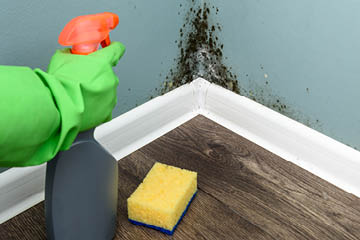
Order on the Agent
November 8, 2024
2024 in Review
December 6, 2024
Order on the Agent
November 8, 2024
2024 in Review
December 6, 2024
Mould in Rental Properties

It is the landlord’s statutory obligation under the Residential Tenancies Act (the Act) to provide and maintain residential premises in good repair. In particular, section 63 of the Act provides that a landlord must provide and maintain the residential premises in a reasonable state of repair, having regard to the age of, rent payable for and prospective life of the premises.
As part of ensuring that a property is habitable, it is necessary for agents to be thorough when inspecting properties to ensure that all issues are identified where possible, and addressed promptly by qualified and appropriate professionals. Mould is just one of many problems that could prevent properties from complying with habitability standards.
Mould can be a significant source of habitability problems in rental properties, and can be present as a direct result of problems relating to the minimum habitability standards, with respect to the structure of the building, it’s ventilation and any plumbing inadequacies. Mould can quickly give rise to health risks or issues.
With the large amount of wet weather that NSW has experienced over the past few months, mould seems to be a concerning issue for agents and their landlords at the present time.
NSW Fair Trading provide advice to landlords, agents and tenants concerning the presence of mould. Susceptible parts of a property include walls, wallpaper, ceilings, bathrooms, carpets, wood, and insulation wherever exposed to water, dampness, or high humidity.
The challenge with mould is that its presence or severity can be affected by the tenant’s use of the property, including:
- by not encouraging ventilation such as opening windows and doors (internal and external)
- by not using heating or cooling appliances to control the internal temperature and humidity of the property
- by regularly drying wet clothes inside the property, raising humidity levels
- by not using extractor fans in bathrooms or exhaust fans in kitchens
What to do if a tenant reports a mould problem
If a tenant reports mould during the tenancy, the agent must notify the landlord and investigate the matter without delay (i.e. within 2 days of being notified by the tenant). The agent should inspect and take photographs of the mould affected rooms/areas of the property and prepare and send a written report with photographs to the landlord.
If the mould is caused by a structural issue i.e. leaking pipe or leaky roof, the landlord or agent must organise to have the issue repaired by a qualified tradesperson, then other remedial works may need to be done to restore the affected room/area to its original condition i.e., cleaning the mould, treating, and painting the affected area etc.
It should be noted that when managing a property in a strata scheme and the issue is on common property, it must be reported to the strata manager or self-managing owners corporation in writing to remedy.
If the cause of mould is not known, a landlord or agent should engage a mould removal and mould remediation specialist to conduct a mould inspection. A mould inspection report will outline the cause of the mould issue and suggest repairs and recommendations to solve the problem. The mould inspection report also provides a quote to remove the mould and provides more information about the removal process.
It is also important that the agent follows-up with tradespeople ensuring that works are being completed in a reasonable timeframe and must keep the landlord and tenant informed throughout the entire process until the mould issue is rectified. If you fail to keep all parties informed of the timeframe for any work being undertaken, it opens liability on the agency for not providing premises that are habitable.
In the event of a dispute, the agent should document all correspondence with all parties in the property file and property management software. These include and are not limited to emails, records of phone conversations and diary notes, reports, photographs, work orders, quotes, invoices, a timeline of your response and action on the matter etc. This information will be required if action is brought against the landlord or agent at the Tribunal.
Complete your property training with ACOP.

